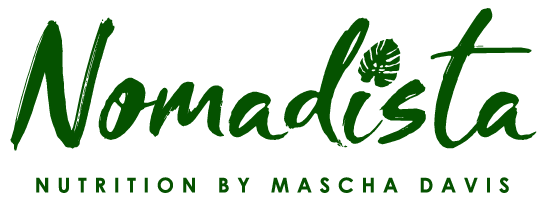Every September, World Alzheimer’s Month reminds us that brain health deserves daily attention. While age and genetics influence Alzheimer’s disease and other dementias, research increasingly shows that what we do every day — how we eat, sleep, move, and handle stress — profoundly shapes our cognitive resilience. At Nomadista Nutrition, I focus on four pillars of prevention and wellness: Nutrition, Sleep, Movement, and Stress Management. Together, they form a framework to keep your brain clear, sharp, and thriving. Let’s explore how each can help protect your memory and mental vitality.
1. Nutrition: Building a Brain-Healthy Plate
Your brain uses about 20% of your body’s energy — it needs high-quality fuel to perform at its best. Brightly colored produce such as berries, spinach, and bell peppers supply antioxidants that help neutralize free radicals, shielding brain cells from damage. Healthy fats are just as vital. Fatty fish, like salmon, sardines, and trout, provide omega-3 fatty acids that form the very structure of your brain’s cell membranes. Regular intake of these fats is linked to improved cognition and may help reduce the risk of age-related decline.
2. Sleep: Your Brain’s Overnight Detox
Sleep isn’t just rest, it’s an active process where the brain clears waste, including beta-amyloid proteins associated with Alzheimer’s disease. Skimping on sleep robs your brain of this nightly cleansing. Aim for 7–9 consistent hours each night. Support your sleep by creating a wind-down ritual (reading, journaling, or light stretching), keeping your room cool and dark, and using a sunrise alarm clock to wake gently, helping your circadian rhythm stay steady. Good sleep habits don’t just make mornings easier, they protect long-term memory function!
3. Movement: Keeping Blood Flowing to the Brain
Exercise is brain food in motion. Physical activity pumps oxygen and nutrients to brain tissue, supporting focus, learning, and mood. Aiming for 150 minutes of moderate movement weekly is ideal, but what matters most is consistency. If workouts aren’t your style, sneak activity into your day: take the stairs, walk your dog a little longer, dance in the kitchen, or stretch between tasks. Even light but frequent movement helps maintain healthy blood flow, which nourishes brain cells and promotes new neural connections.
4. Stress Management: Protecting Memory from Wear and Tear
Persistent stress raises cortisol levels, which over time can shrink brain regions responsible for memory and learning. Intentional relaxation is not a luxury, it’s brain protection! Try weaving small stress resets into your day: pause for three slow, deep breaths before a meeting, write down three things you’re grateful for, enjoy a walk in nature or time with loved ones, or use guided meditations or journaling to calm mental chatter. These practices don’t just reduce tension; they foster emotional resilience and can help your brain stay sharp as you age.
The Bottom Line
There’s no single way to prevent Alzheimer’s, but science shows that simple, consistent habits can keep your brain healthier for longer. Think of these four pillars as a long-term investment: the earlier you begin, the greater the payoff for memory, focus, and overall vitality.
Want to turn these ideas into an actionable routine? Here at Nomadista Nutrition I can create your personalized Brain-Healthy Blueprint, a clear, science-backed plan covering what to eat, how to optimize sleep, supplements, realistic movement strategies, and stress-management tools you’ll actually use! If you have questions, you can contact me here!



